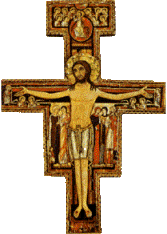“The spirituality of the Secular Franciscan is a plan of life centered on the person and on the following of Christ, rather than a detailed program to be put into practice.” (Article 9: SFO General Constitutions [GC].
In an earlier reflection I remarked: “What is characteristic of a spiritual family or tradition is that it embodies a ‘spirituality'; which is another name for a 'way', a 'path', […] which guides us towards our calling: Living the Gospel in union with Christ.” With that in mind let’s examine the article above from our SFO General Constitutions.
How often do we even think about a ‘plan of life’? Are we generally aware of any purpose or plan? I have to sadly admit that too often I find myself drifting through life aimlessly, shielded by habits and routines developed to maximize comfort and avoid stress. This might mean that I have a set of conflicting life plans, or one anemic plan, etc., you get the point. Just writing this makes me aware that I need a course correction…a boatload of ongoing conversion.
But our spirituality calls for a ‘plan of life’ that is centered on the person and on the following of Christ… This is a plan based upon living in a real relationship with the person of Jesus, one that should be growing through inspiration and prayer in clarity of purpose, and deepening in commitment over time. We should see our lives resembling the gospel more and more.
Since we are individuals with different talents, inspirations and circumstances, we have unique plans of life; but what they should have in common is that they are ‘centered on the person and on the following of Christ’. As our Seraphic Father has said, “I have done what is mine to do, may Christ teach you what is yours to do.” (2Celano, 214)
In my opinion, the main goal of never ending Fraternity formation is to develop and animate our ‘Christ-centered plan of life’. This includes the difficult process of our own transformation (what Franciscans call ‘conformation’): that dying to self and living in Christ. The foundation to all of this is persistent prayer and reflection on the gospels…going from gospel to life and life to the gospel. (Art.IV, SFO Rule)
So, if we’re responding to a genuine call, our initial task becomes a radical reorientation of ‘our own life plan’ (some might call this repentance), to one based upon the person of Jesus: to bring forth his presence and to do his will. We’re successful to the extent that we’re united in Christ and that we reveal him to one another. Yet even more mysterious is when Christ disguise’s himself in us in order to accomplish his Will.
Somehow we need to call to mind what it is that the Franciscan family represents; and to know its mission in the Church and in the world. From that perspective, how are you preparing for your mission…do you have a ‘plan of life’?




